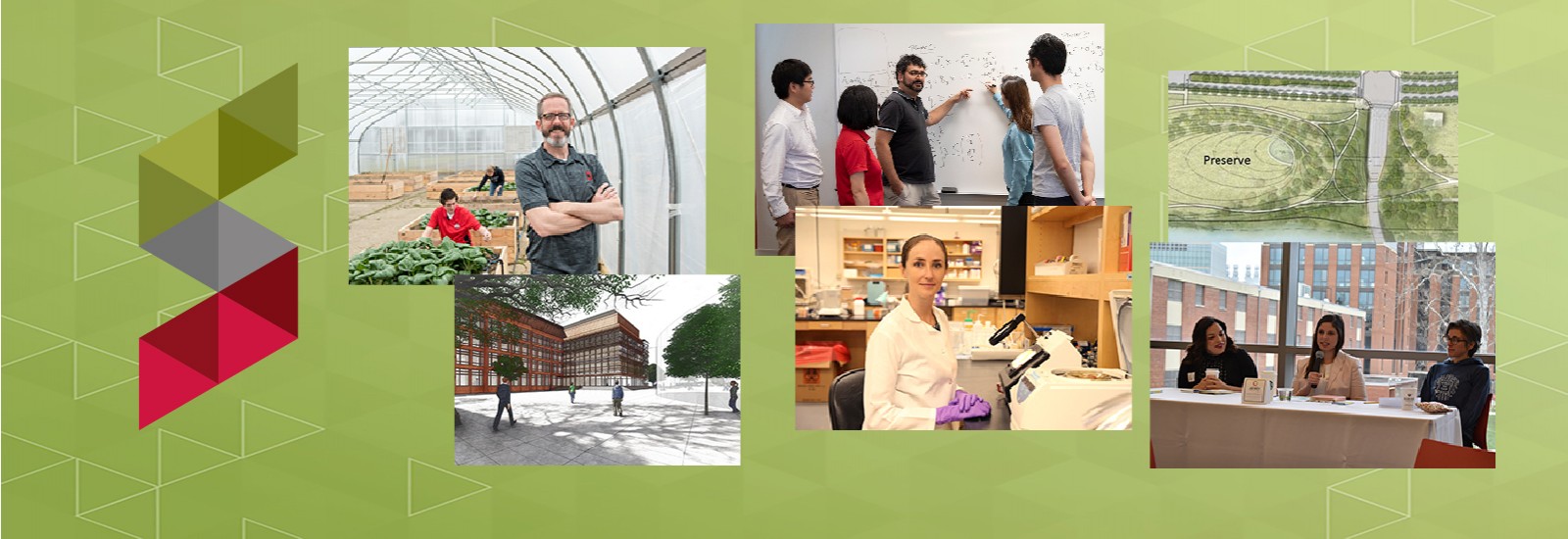One year ago, Ohio State launched the Sustainability Institute to support and integrate sustainability and resilience scholarship and activities across the university.
“We are committed to helping Ohio State reach its aspiration of being a world leader in developing durable solutions to the pressing global challenges of sustainability,” says Kate Bartter, Sustainability Institute executive director.
The institute promotes sustainability and resilience research, teaching and learning; builds collaborations with public and private sector partners to develop and apply sustainable solutions; and works to integrate sustainability scholarship with campus activities to engage students in research and experiential learning.
“We are especially proud of Ohio State’s amazing faculty, including SI’s 30 core faculty and seven faculty leaders, and staff and students who work every day to make our campus and community more sustainable and resilient,” says Faculty Director Elena Irwin. “Our 266 affiliated SI faculty have brought in $33.5 million in research funding in the past year.”
The institute also coordinates and accelerates the university’s Sustainability Goals, which were set in 2015 to further integrate sustainability into teaching, research, curriculum, operations and community partnerships. The goals also guide the university toward achieving zero waste; reducing energy and water use and the footprint of its fleet vehicles; and increasing ecosystem services, locally and sustainably sourced food and environmentally preferred product standards.
2019 Accomplishments Highlights
Research
- University trustees approved $3M for design of the Energy Advancement and Innovation Center, a hub where faculty members, students, alumni, ENGIE researchers, local entrepreneurs and industry experts will work together on the next generation of smart energy systems, renewable energy and green mobility solutions.
- Combining natural rubber with bioplastic in a novel way results in a much stronger replacement for plastic, according to research by Katrina Cornish, horticulture and crop science and Sustainability Institute Faculty Advisory Board, and Yael Voldovotz, food science and technology and institute affiliated faculty.
- Kip Curtis at the Ohio State University at Mansfield launched an urban sustainable food-system project that will increase area residents’ access to fruits, vegetables and other specialty crops while supporting the local economy. The project is supported by a $2 million matching grant from the Foundation for Food and Agriculture Research.
- People who get their water from rural, small water systems are at a greater health risk of exposure to bacteria and other harmful pathogens. Sustainability Institute core faculty member Natalie Hull, civil environmental and geodetic engineering, reports that disinfection by UV light LEDs may be a sustainable water treatment option.
Education and Learning
- The Sustainability Education and Learning Committee submitted a report on undergraduate sustainability education to the Office of Academic Affairs, providing a coordinated approach in support of cross-unit collaboration, strengthening existing academic programs and creating new academic programs
- Researchers received a $3 million National Science Foundation grant for “Convergent Graduate Training and EmPOWERment for a Sustainable Energy Future” to develop and implement bold, transformative models for STEM graduate education training.
- The student team “Wasted Opportunities” won funding from Ohio State Energy Partners’ Smart Campus Challenge to collect otherwise wasted food from on-campus dining facilities to distribute to local foodbanks in need.
- The Sustainability Institute awarded $30,000 to support student projects that enhance academic work and improve campus landscapes and operations to move toward the Ohio State sustainability goals.
Outreach
- Faculty, students, staff and community partners attended the 2019 Community Engagement Conference to discuss research, partnerships and resources to help build sustainable and resilient communities.
- Ohio State students studying sustainability and women working in the sustainability professions met in April to network, discuss opportunities in the field and share ideas at the 2019 Women in Sustainability Breakfast.
- Ohio State and 20 other top-tier research universities in the University Climate Coalition are taking action for effective climate change policy.
- An ongoing survey of Ohio State undergraduates shows researchers and university sustainability leaders that students’ knowledge, attitudes and actions regarding sustainability are increasing over time.
Operations
- Ohio State aims to increase local and sustainable food options provided in its dining facilities to equal at least 40% of its offerings within the next six years.
- The Ohio State Sustainability Fund committed funds for 10 projects in FY 2019, ranging from updating the university’s online sustainability project map to establishing a permanent living lab on campus to test behavioral drivers of energy conservation actions.
- The University Panel on Ecosystem Services advanced Ohio State’s academic mission by setting a goal of enabling 100 learning projects on the campus landscapes and natural environment.
- To better protect the Columbus campus from future floods, the university is restoring lands along the Olentangy River to a more natural state. Phase 1 will add about 18 acres of new green space on the university’s highly urbanized campus, aiding the water quality and providing additional outdoor recreational opportunities. SI partnered with the Office of Planning, Architecture and Real Estate to ensure that the site will be planted with over 300 new trees.
Outstanding Faculty
- Katrina Cornish, horticulture and crop science; food, agricultural and biological engineering; and Sustainability Institute Faculty Advisory Board: Ohio State Innovator of the Year
- Karen Dannemiller, civil, environmental and geodetic engineering; Sustainability Institute Faculty Advisory Board and Core Faculty: National Science Foundation CAREER Award
- Rattan Lal, Environment and Natural Resources, Sustainability Institute affiliated faculty: Japan Prize
- Lonnie Thompson, earth sciences and Sustainability Institute affiliated faculty: American Academy of Arts and Sciences member
